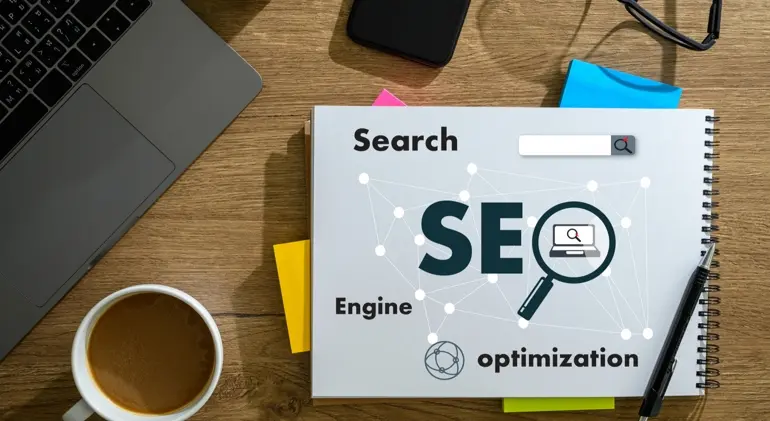- Your cart is empty Browse Shop
What is Search Engine Optimization (SEO)? – A Friendly Guide for Beginners

Let’s face it — the internet is crowded. Thousands of websites are competing for attention, and if you want yours to stand out, you need to be seen. That’s where Search Engine Optimization (SEO) comes in.
If you’ve heard the term “SEO” but still aren’t quite sure what it means or how it works, don’t worry — you’re not alone. Let’s break it down in simple terms.
So, What Exactly is SEO?
Think of SEO as a digital roadmap that helps people find your website when they search on Google (or Bing, or Yahoo… but mostly Google).
When someone types a query like “best coffee shop near me” or “how to learn guitar,” Google sifts through billions of pages to show the most helpful ones at the top. SEO is what helps your website get to that top list.
It’s about:
- Using the right keywords,
- Creating helpful, valuable content,
- Making your website easy to understand (for both humans and search engines),
- And building your online credibility.
Why Should You Even Care About SEO?
Great question. Here’s why SEO matters — especially if you run a business, blog, or brand online:
- Free traffic: Unlike ads, SEO doesn’t cost per click. You rank high, and people find you — for free.
- Better visibility: Your website appears in front of the right audience at the right time.
- Builds trust: People trust search engines. If Google ranks your site well, people are more likely to trust you too.
- Long-term results: Good SEO continues to pay off for months (even years).
Think of SEO as an investment, not an expense.
How Does SEO Work? A Simple Overview
Let’s say you run a bakery in Delhi. You want to show up when someone searches “best cupcakes in Delhi. Here’s what you’ll need to do (in SEO terms):
1. Choose the Right Keywords
These are the words and phrases your potential customers type into search engines. You want to find what they’re searching for — and use those terms on your site.
Example: Instead of just saying “our products,” you say “freshly baked cupcakes in Delhi.”
2. Optimize Your Content
Make sure your content is well-written, helpful, and easy to read. Include your keywords naturally — not by stuffing them everywhere.
Also:
- Use headlines (H1, H2, etc.)
- Add images with alt text
- Keep it mobile-friendly
3. Improve Technical SEO
This is the “under-the-hood” part:
- Make sure your site loads fast
- Use a secure connection (HTTPS)
- Fix broken links
- Submit your sitemap to Google
Build Backlinks
When other websites link to your content, it tells Google you’re trustworthy. These links — especially from good websites — boost your authority and rankings.
On-Page vs. Off-Page vs. Technical SEO
Let’s keep this light and breezy:
- On-Page SEO = Everything on your site (content, keywords, headings)
- Off-Page SEO = Everything outside your site (backlinks, social sharing)
- Technical SEO = Website structure, speed, mobile usability, indexing
You don’t need to be a tech expert to start. Just focus on making your content helpful, and improve step-by-step.
Does SEO Actually Work?
Yes — and here’s why it’s worth the effort:
Imagine your website is a shop. SEO is the signboard, lighting, and location — it helps people find and trust you.
- With consistent SEO, you can:
- Rank on the first page of Google
- Get more clicks, calls, and sales
- Build your brand’s online presence
- Stay ahead of competitors who don’t prioritize SEO
Tips to Get Started with SEO
If you’re wondering how to begin without getting overwhelmed, try this:
🔹 Start with Keyword Research
Use free tools like Google Keyword Planner, Ubersuggest, or AnswerThePublic to discover what your audience is searching for.
🔹 Write Helpful Content
Focus on solving problems or answering questions. Google loves content that’s valuable and well-structured.
🔹 Optimize Your Pages
Use meaningful title tags (e.g., “Affordable Wedding Photography in Mumbai”)
Write clear meta descriptions
Add internal links between your pages
🔹 Get Backlinks
Reach out to blogs in your niche. Try guest posting, business directories, or getting listed on industry websites.
🔹 Track Your Results
Use Google Search Console and Google Analytics to monitor performance, keyword rankings, and page views.
SEO is a Long-Term Game — But Totally Worth It
Here’s the honest truth: SEO doesn’t give you results overnight.
It takes time, effort, and consistency. But once your site starts ranking, the benefits are long-lasting. Instead of paying every time someone clicks (like ads), your site brings in organic traffic for free — 24/7.
Final Thoughts
Search Engine Optimization doesn’t have to be confusing or overwhelming. It’s simply the process of helping your website show up where it matters — on search engines, in front of people who are already looking for what you offer.
Whether you’re a blogger, small business owner, freelancer, or just curious — SEO is a skill worth learning and a strategy worth investing in.
Need help getting started with SEO for your website? Feel free to reach out — or explore beginner-friendly SEO tools and resources. The earlier you start, the sooner you’ll start seeing results!
FAQs
01 What is SEO and how does it work?
SEO (Search Engine Optimization) is the process of improving your website so it ranks higher on search engines like Google. It works by optimizing content, structure, keywords, and links so that search engines understand your website better and show it to the right audience.
02 Why is SEO important for a website?
SEO helps your website become more visible on search engines. More visibility means more visitors, more trust, and potentially more sales or leads — all without paying for ads!
03 What are keywords in SEO?
Keywords are the words or phrases people type into search engines. Using relevant keywords in your website content helps Google know what your page is about and match it to the right searches.
04 How long does SEO take to show results?
Usually, 3 to 6 months for noticeable improvements, depending on your competition, keyword difficulty, and how consistent you are with SEO efforts.
05 Can I do SEO by myself or do I need an expert?
Yes, you can start SEO yourself, especially for a small website. But for bigger websites, competitive industries, or faster growth — hiring an SEO expert or agency helps you avoid mistakes and get better results.
06 What tools are used in SEO?
Popular SEO tools include:
1. Google Search Console
2. Google Analytics
3. Ubersuggest
4. SEMrush
5. Ahrefs
6. Screaming Frog (for technical audits)
1. Google Search Console
2. Google Analytics
3. Ubersuggest
4. SEMrush
5. Ahrefs
6. Screaming Frog (for technical audits)

